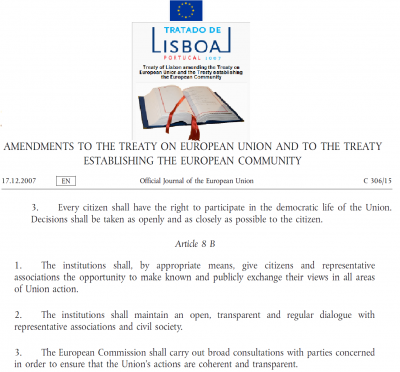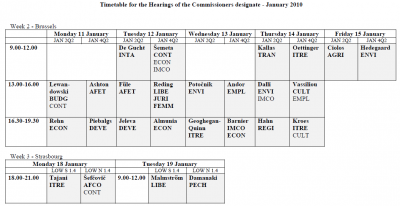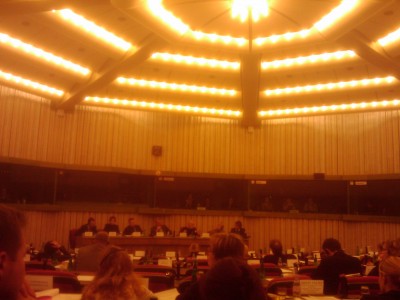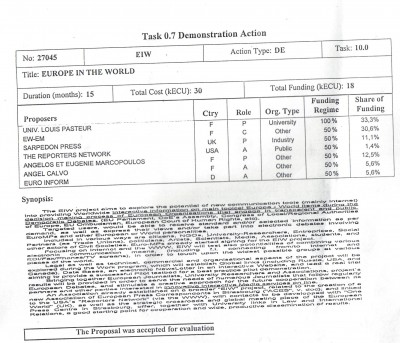 newsitems
newsitems  EU Commissioners-designates' Hearings, Debate + Vote by EU Parliament: Will EU Citizens have a say ?
EU Commissioners-designates' Hearings, Debate + Vote by EU Parliament: Will EU Citizens have a say ?
EU Commissioners-designates' Hearings, Debate + Vote by EU Parliament: Will EU Citizens have a say ?

"EuroFora" believes that the Hearings, Debates and Votes organized by EU Parliament on New EU Commissioners-designates throughout all January 2010 should provide an opportunity also for EU Citizens to interact with their elected MEPs and/or to engage in public Debates freely expressing their views on the main issues, while being duly informed, in order to boost Public Scrutiny and reinforce the Democratic character of EU's decision-making proces, while also contributing to make EU Institutions more popular, helping to bridge the infamous "gap" vis a vis the People.
For this purpose, EU Citizens could f.ex. have a fair chance, previously, to contact their MEPs at least for the preparation of the questions they will raise to EU Commissioners-designates, and/or in view of their Evaluation, final Debate and Vote, in order to timely and usefully exchange views. If it's not done now, it should be done in the Future, (starting to apply also the relevant EU Lisbon Treaty rules : fex. Art. 8 B).

For the moment, as things stand, EU Citizens can watch the Hearings on Video at :
http://ec.europa.eu/avservices/ebs/schedule.cfm
http://europa.eu/press_room/index_en.htm
http://europarltv.europa.eu/
http://www.europarl.europa.eu/hearings/default.htm?language=en
http://www.europarl.europa.eu/wps-europarl-internet/frd/vod/research-committee-and-other?byLeftMenu=researchotherevents&isSearchOtherEvents=true&language=en
Previous Hearings, before the entry into force of Lisbon Treaty, (whose Article 8 B asks for EU Citizens to participate in Public Debates on EU activities : See relevant replies to "EuroFora"s questions by EU Commission, EU Parliament and Spanish EU chairmanship at : ) , can be reviewed at : http://www.europarl.europa.eu/hearings/commission/default_en.htm
Thus, EU Citizens can compare and judge if there is any real change, and how important it is, or could and should be.
The very "tight" Time - SCHEDULE of the Hearings starts on Monday afternoon with Foreign Affairs (Ashton) and Development (Piebalgs), in parallel with Budget (Lewandowski), Economic and Monetary affairs (Rehn).
- It is followed, since Tuesday Morning, by Trade (De Gucht) and Taxation, Customs and anti-Fraud (Semeta).
Enlargement and Neighbourhoud policy (Füle), as well as International Cooperation, Crisis' responses and Humanitarian affairs (Jeleva), are on the Afternoon, in parallel with Human Rights and Citizenship (Reding), as well as Competition policy (Almunia).
- On Wednesday Afternoon, Environment (Potocnik) and Research, Innovation and Science (Geoghegan - Quinn), come in parallel with Employment and Social affairs (Andor), as well as Internal Market and Services (Barnier).
- On Thursday Morning, Energy (Oettinger) and Transports (Kallas). Followed, in the Afternoon, by Health and Consumer policy (Dalli), Education, Culture, Multilinguism and Youth (Vassiliou), as well as Digital Agenda (Kroes) and Regional policy (Hahn).
- Friday Morning, the Brussels' week concludes with Agriculture (Ciolos) and Climate (Hedegaard).
- Next week in Strasbourg, on the sidelines of the Plenary Session, EU Parliament starts on Monday evening with Industry and Entrepreneurship (Taviani), as well as Istitutional affairs and Administration (Sefcovic).
- It continues on Tuesday Morning with Home affairs (Malmstrom), in parallel with Maritime affairs and Fisheries (Damanaki).

The President of EU Commission (Barroso) was voted by EU Parliament before the entry into force of the new EU "Lisbon" Treaty, as early as since mid-September in Strasbourg, but the official anouncement of the EU Commissioners-designate and their portofolios came only 2,5 Months later, (after the completion of "Lisbon" Treaty's Ratification), at the end of November.
Once EU "Lisbon" Treaty entered into force, December 2009 was used for a formal, written procedure, during which EU Parliament send a Questionaire to each Commissioner-designate, who replied also by writing.
It's only on January 2010 that start direct, oral Questions - Answers and Debates between MEPs and EU Commissioners-designates. They will be evaluated by each EU Parliament's Committee, as well as by the Chairmen of the Political Groups, until the final, General Debate and Vote, which is due before the end of the Month (Jan. 29), so that the new EU Commission might be able to begin working, with EU Council's approval, from February 2010.
In strictly Legal terms, EU Parliament can only vote for, or against, the entire EU Commission's team. But, in practice, it has been established that MEPs might refuse 1 or 2 Commissioners only, who should then be replaced by new Candidates, able to agree on the main Political issues with the Majority in EU Parliament which was voted by EU Citizens as it emerged from June 2009 EU Elections.
It's through this process that EU Citizens hope to make their democratically expressed choices respected.
* Here is a LIST of Commissioners-designate according to their areas of competence :
- Commission President : José Manuel Barroso (EPP), Portugal
- EU foreign policy chief (Vice-President) : Catherine Ashton (PES), United Kingdom
- Industry and Entrepreneurship (Vice-President) : Antonio Tajani (EPP), Italy
- Transport (Vice-President) : Siim Kallas (ELDR), Estonia
- Competition (Vice-President) : Joaquín Almunia (PES), Spain
- Justice, Fundamental Rights and Citizenship (Vice-President) : Viviane Reding (EPP), Luxembourg
- Institutional Affairs and Administration (Vice-President) : Maros Sefcovic (PES), Slovakia
- Digital Agenda (Vice-President) : Neelie Kroes (ELDR), The Netherlands
- Budget : Janusz Lewandowski (EPP), Poland
- Internal Market and Services : Michel Barnier (EPP), France
- Economic and Monetary Affairs : Oli Rehn (ELDR), Finland
- Trade : Karel De Gucht (ELDR), Belgium
- Taxation and Customs Union, Audit and Anti-Fraud : Algirdas Šemeta (EPP), Lithuania
- Energy : Günther Oettinger (EPP), Germany
- Agriculture : Dacian Ciolos (EPP), Romania
- Maritime Affairs and Fisheries : Maria Damanaki (PES), Greece
- Regional policy : Johannes Hahn (EPP), Austria
- Research, Innovation and Science : Maire Geoghegan Quinn (ELDR), Ireland
- Education, Culture, Multilingualism and Youth : Androulla Vassiliou (ELDR), Cyprus
- Employment, Social Affairs and Inclusion : László Andor (PES), Hungary
- Home Affairs : Cecilia Malmström (ELDR), Sweden
- Health and Consumer Policy : John Dalli (EPP), Malta
- Environment : Janez Potocnik (ELDR), Slovenia
- Climate Action : Connie Hedegaard (EPP), Denmark
- Enlargement and Neighbourhood Policy : Stefan Fuele (PES), Czech Republic
- International Cooperation, Humanitarian Aid and Crisis Response : Rumiana Jeleva (EPP), Bulgaria
- Development : Andris Piebalgs (EPP), Latvia
Main Menu
Home Press Deontology/Ethics 2009 Innovation Year EU endorses EuroFora's idea Multi-Lingual FORUM Subscribers/Donors FAQs Advanced search EuroFora supports Seabird newsitems In Brief European Headquarters' MAPs CoE Journalists Protection PlatformBRIEF NEWS
- 00:00 - 02.06.2021
- 00:00 - 18.10.2020
- 00:00 - 19.06.2020
- 00:00 - 18.05.2020
- 00:00 - 20.04.2020
- 00:00 - 02.02.2020
- 00:00 - 09.12.2019
- 00:00 - 27.11.2019
- 00:00 - 16.11.2019
Popular
- Yes, we could have prevented Ferguson riots says World Democracy Forum's Young American NGO to ERFRA
- Spanish People Elect CenterRIGHT Majority with 1st Party and Total of 178 MPs (6 More than the Left)
- Pflimlin's vision
- The European Athletic "Dream Team", after Barcelona 2010 Sport Championship Results
- Source Conseil d'Europe à ERFRA: Debatre Liberté d'Opposants à Loi livrant Mariage+Enfants à Homos ?
- Head of BioEthics InterGroup, MEP Peter Liese : "Embryonic stem cell research reaching its END" !?
- Spain: Jailed Turkish Terror suspect with Explosive,Drones,Chechen accomplices stirs Merah+ Burgas ?
- UN Head Ban Ki Moon at CoE World Democracy Forum : - "Listen to the People !"
Latest News
- EUOmbudsmen Conference 2022: Digital Gaps affect People's Trust threaten EF Project on EU Future ?
- French Election : Black Out on Virus, but Obligation for Fake 'Vaccines" Challenged
- Both French Presidential Candidates point at "Humanism" in crucial times...
- France : Zemmour = Outsider may become Game Changer in Presidential + Parliamentary Elections 2022
- PACE President Cox skips Turkey Worst (Occupation) case compared to Russia (DeMilitarisation) query
Statistics
Visitors: 59494042Archive
Login Form
Other Menu

Facing a 70% Abstention threat in 2009 Election, EU endorses EuroFora's idea for Citizens' debates on crucial EU decisions !
- Different views on "Europe's Future", should be debated among Citizens at June 2009 EU Elections, thanks to political Parties' "Manifestos", says EU Parliament's Report
A main idea, initiated and promoted by EuroFora's founders since 1997: the vital need to develop European Citizens' democratic right to actively participate in multilingual debates on EU decisions, is formally endorsed by the EU from 2009 !
The move is a key attempt to overcome "catastrophic" Polls which warn that only ...30% of Citizens are ready to vote in the forthcoming June 2009 EU Election ! This was revealed by EU Commission's vice-president, in charge of Communication policy, Margot Wallstrom, during a "hot" meeting of EU Parliament's Committee on Culture and Education, during the December 2008 Strasbourg session.
Wallstrom faced criticism, but also suggestions from various MEPs, naturally worried by Abstention threats which herself found even "worse" than in 1999 or 2004...
A Report on "Active Dialogue with Citizens",examined at the same time, presented some useful practical tips, on "facilitating Interviews"; etc., but also a potentialy important call to "incorporate the conclusions of ...debates...into (EU) policies, and take into consideration the expectations that Citizens have of the EU when deciding". An amendment even implies that Citizens' participation in debates on EU decisions is a democratic "Right".
More importantly, it finds that a Debate "on the Future of Europe", (as French President Nicolas Sarkozy has asked since 2007), would be a good idea " for the 2009 European parliamentary Elections", because "clarifying the political differences between the EU political parties would help citizens to identify themselves with, and choose between various concepts", for which "all parties (should) present their Manifesto".
A "Joint political declaration on Communicating Europe in Partnership", co-signed by "the European Parliament, Council and ... Commission", confirms that they "attach the utmost importance to improving communication on EU issues", by "enabling European citizens to exercise their right to participate in the democratic life of the Union, in which decisions are taken as openly as possible and as closely as possible to the citizens, observing the principles of pluralism, participation, openness and transparency".
This should "enable Citizens to exercise their right to express their views and to participate actively in the public Debate on European Union issues", while also "promoting the respect of multilingualism". In this regard, EU confirms its "wish to develop synergies with national, regional and local authorities as well as with representatives of Civil Society".
It's since 1997 that a group of EuroFora's founders have officially presented a pioneer Project (then called "EIW", for "Europe in the World"), which aimed to develop Strasbourg's "Polyphonic music", by providing "Interactive information", on "main issues ... during the Decision-making process of European Organizations which engage in Transparent and Public Democratic Debates"
This should be done, inter alia, by "exploring the potential of New Communication Tools (mainly Internet)", as well as classic-form debates, the 1997 EIW pioneer project's anounced in its "Synopsis". It was formally "accepted for evaluation" by EU Commission in Brussels in order to be examined for a grant in the framework of the "Research/Technology/Development (RTD) Programme in the field of Information Technologies", then called "ESPRIT", as a "Best Practice Pilot Project".

But the vital, urgent Political need for EU to search new, efficient ways to reach the People and interact with European Citizens, was really felt in Brussels and elsewhere only after the unprecedented in History 1999 and 2004 Majority Abstention in EU Elections, followed by 3 "NO" in Referenda in France, the Netherlands and Ireland, on 2005 and 2008...
In this New Political Landscape, we prepared a new, actualised and more developed version of our initial idea, in a simplified and more efficient form, thanks also to a large Experience accumulated during many years of EU/CoE/UNO Press work and Multi-lingual debates, with the New project "EuroFora" :
On 2006 we presented in Public its main lines during Questions/Replies that we raised at two Press Conferences by EU Commission President, Jose Baroso, and mainly EU Commission's vice-President, in charge of Communication policy, Margot Wallstrom, together with EU Parliament's vice-president, Alejo Vidal-Quadras, in Strasbourg, (Videos available), and we reminded it at various brief contacts with Commissioner Wallstrom in 2007 and 2008.
Meanwhile, a new Text was also presented for "EuroFora" Project mainly to certain Political and other personalities, at European, National or Regional/Local level, mainly in 2007, but also in 2008..
Now, after the unexpected 2008 Irish "NO", and before the 2009 EU Elections, which are due to be of exceptionally crucial importance for Europe's Future, the moment has obviously come to launch that project, progressively, but in real practice.
Whoever really cares for Europe and its Citizens is welcome to join, in one way or another. Only anti-European, anti-democratic, obscure or ignorant groups might oppose or attempt to "steal" and deviate the main idea.
But European Citizens, incited by enlightened political leaders, are those who will finally write the real History.


















